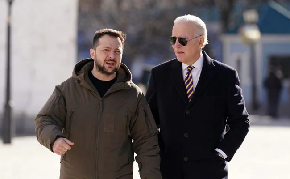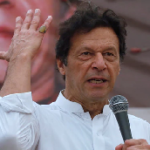U.S. President Joe Biden made an unannounced visit to Kyiv today, promising President Volodymyr Zelensky that Washington would stand with Ukraine as long as it takes, in a strong show of support ahead of the war’s one-year anniversary.
Sirens blared across the Ukrainian capital as he was there, though there were no reports of Russian missile or air strikes.
“When Putin launched his invasion nearly one year ago, he thought Ukraine was weak and the West was divided. He thought he could outlast us. But he was dead wrong,” Biden said, praising Ukrainians for their bravery in resisting Russia’s invasion.
“The cost that Ukraine has had to pay is extraordinarily high. Sacrifices have been far too great … We know that there will be difficult days and weeks and years ahead.”
The U.S. president promised a further $500 million worth of weaponry, including artillery ammunition, anti-armour systems and air defence radars, plus tighter sanctions on Russia.
Zelensky told Biden his visit was “an extremely important sign of support for all Ukrainians.”
The visit came a day before President Vladimir Putin was due to make a major address, expected to set out Russia’s aims for the second year of what he now calls a proxy war against the armed might of the West.
“Of course for the Kremlin this will be seen as further proof that the United States has bet on Russia’s strategic defeat in the war and that the war itself has turned irrevocably into a war between Russia and the West,” said Tatiana Stanovaya, a Russian political analyst.
“Tomorrow’s address was expected to be very hawkish, targeted at a demonstrative rupture of relations with the West. Now additional edits could be introduced to make it even tougher.”
Winter Offensive
The anniversary has taken on more than symbolic significance, becoming what the West views as the principal motivation for the war’s deadliest phase, with Moscow hurling thousands of conscripts and mercenaries into a winter offensive.
Russia has secured only scant gains so far in assaults in frozen trenches up and down the eastern front in recent weeks. Kyiv and the West see it as a push to give Putin victories to tout a year after he launched Europe’s biggest war since World War Two.
Moscow received its own apparent signal of diplomatic support on Monday, with Chinese foreign minister Wang Yi expected in the Russian capital for talks. In public, China has so far remained neutral over the conflict despite signing a “no limits” friendship pact with Russia weeks before the invasion.
Washington has said in recent days it is concerned Beijing could begin supplying Moscow with arms. Chinese foreign ministry spokesperson Wang Wenbin said the United States was “in no position to make demands of China”, and China’s “comprehensive collaborative partnership with Russia” was a matter for two independent states.
Russia is trying to secure full control of two eastern provinces that form Ukraine’s Donbas mining and industrial region. It has launched assaults at locations running from Kreminna in the north down to Vuhledar in the south, securing most of its recent gains around the mining city of Bakhmut.
Kyiv, which is absorbing a major influx of Western weaponry in coming months for a planned counter-offensive, has lately stuck mainly to defence on the battlefield, claiming to be inflicting huge casualties on the assaulting Russian forces.
“We are breaking down the invaders and inflicting extraordinarily significant losses on Russia,” Zelensky said in his nightly video address. “The more losses Russia suffers there, in Donbas – in Bakhmut, Vuhledar, Marinka, Kreminna – the faster we will be able to end this war with Ukraine’s victory.”
‘Political Pressure’
Britain’s Ministry of Defence said Russia was taking huge casualties, including two elite brigades of thousands of marines probably rendered “combat ineffective” in failed attempts to storm Vuhledar, a heavily fortified Ukrainian bastion.
“The Russian forces are likely under increasing political pressure as the anniversary of the invasion draws near,” it said, predicting Moscow would claim to have captured Bakhmut regardless of the situation on the ground. “If Russia’s spring offensive fails to achieve anything, then tensions within the Russian leadership will likely increase.”
The failed Russian assaults on Vuhledar, where Ukrainian forces are guarding the junction of the eastern and southern fronts, have led to recriminations among Russian pro-war bloggers. Western governments say Moscow has lost thousands of men and scores of armoured vehicles trying to storm it across fields scattered with landmines in sight of Ukrainian artillery.
Inside Vuhledar, the constant sound of explosions shook the ruins. A pensioner emerged from the cellar where she lives with her dog, and showed a Reuters journalist around the rubble of her flat above, where a shell had blasted through the wall.
She said she had been saved when the room was hit because a fridge had fallen on top of her. A neighbour’s daughter found her and dragged her out.
“Scary is not the word. It is terrifying,” she said.
The war since Feb. 24 last year has killed tens of thousands of Ukrainian civilians and soldiers on both sides, driven millions from their homes and reduced cities to rubble.
Since the start of this year, the West has pledged far greater military support for Ukraine, including hundreds of tanks and armoured vehicles.
Kyiv wants more, including longer-range rockets and war planes, both of which would break a taboo against supplying weapons capable of striking deep into Russia.
Ukraine insists Western countries are on the brink of sending jets.
The question is when the decision will be announced,” Defence Minister Oleksiy Reznikov said on television. “The important question is how many planes are available to be handed over and what kind of weapons will be on them.”



